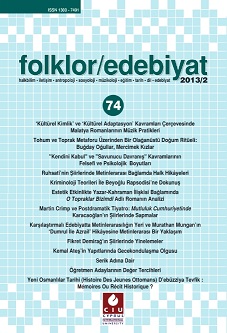Kriminoloji Teorileri İle Beyoğlu Rapsodisi’ne Dokunuş
Touching Beyoğlu Rapsody with Theories of Criminology
Author(s): Murat Cem DemirSubject(s): Turkish Literature, Social differentiation, Criminology, Radical sociology
Published by: Uluslararası Kıbrıs Üniversitesi
Keywords: Crime; Sociology of Crime; Beyoğlu; Social Disorder; Anomy and Devolopmental Criminology;
Summary/Abstract: This study analyses the book named “Beyoğlu Rapsodisi” of Ahmet Ümit, who is one of the successful Contemporary Turkish Literature in the light of main assumptions of three theories of criminology. Here a literary critique is not made nor does it criticize the book. The aim is to examine the rich content of the book in the light of theories and to create a reference to theories. As a matter of the fact that assuming what was underlined in the text as the representation of the field and explaining with theories somehow identifying the real with literary construct. This process that contains problems is tried to be enlightened under the light of the “social disorder” and “anomy” and the concepts of the Developmental Criminology so as the events in the book are explained with these theories. Of these theories the first is called social disorder. This theory accepts the city as an ecosystem and explains the social pattern of the city with Darwin’s notion of “wild life”. Migration, poverty, marginalization and crime are the phenomena of the city. Neighborhood of Beyoğlu and the life going on there are tried to be explained with the conceptual sets of this approach. And our second theory is that of the developmental criminology. This theory asserts that there is a sessional relationship between the life practice of a culprit and the moment of taking part in crime. This claimed relationship between life variable and crime and the types of crime is adapted to the novel to try to understand the life sequence of a murderer. Lastly, I make use of the theory of anomy to explain crime and deviation. The theory of anomy tries to understand that how as a result of prevention, tension and oppression individuals lean toward crime and deviation to achieve a goal
Journal: Folklor/Edebiyat
- Issue Year: 19/2013
- Issue No: 74
- Page Range: 85-96
- Page Count: 12
- Language: Turkish

